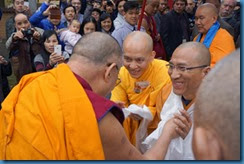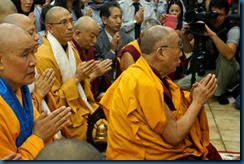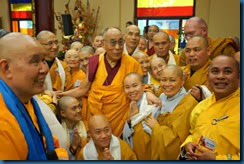Fr: Pho Nguyen* Hung Do Duc
His Holiness the Dalai Lama Concludes his European Tour with a Visit to the Vien Giac Vietnamese Temple
September 20th 2013 Hanover, Germany, 20 September 2013 - The concluding engagement of His Holiness the Dalai Lama’s current tour of Europe was a visit to the Vien Giac Vietnamese Temple in Hanover. On arrival he recognised several friends among the monks who came to receive him as he stepped out of his car and who then escorted him into the Temple. His Holiness the Dalai Lama arriving at the Vien Giac Vietnamese Buddhist Temple in Hanover, Germany on September 20, 2013. Photo/Jeremy Russell/OHHDL
His Holiness the Dalai Lama arriving at the Vien Giac Vietnamese Buddhist Temple in Hanover, Germany on September 20, 2013. Photo/Jeremy Russell/OHHDLAfter paying his respects before a standing image of the Buddha, His Holiness sat to recite prayers before taking his seat on the prepared throne. Beginning his talk “I’m very happy to have been able to come to visit this Vietnamese temple. Historically, among the followers of the Buddha, those who uphold the Pali tradition are senior and among those who follow the Sanskrit tradition, the Chinese and then the Vietnamese, Korean and Japanese are senior. Buddhism came to us Tibetans later, and it is customary for junior students like us to show respect to their seniors. It is now more than 2500 years since the Buddha passed away and students in different parts of the world still follow his teachings, which is a source of joy.” He noted that in this twenty-first century technology is highly developed, but can be a cause of terrible destruction. What we need is to pay more attention to our inner values in order to develop inner peace. Under such circumstances we will be able to ensure that we use technology constructively. He acknowledged that the Vietnamese people experienced great suffering and immense destruction due to the power of modern weapons during the war in their country. He recalled once flying over Vietnam on his way to Japan during that period and seeing B52 bombers from his window; he said he couldn’t help thinking of the people on the ground below. Now, in many parts of the world there is a strong feeling against the use of violence and a robust desire for peace. Anti-war, anti-violence movements are strong. Values expressed by our various religious traditions like love, compassion, tolerance and self-discipline remain very relevant. Therefore, these traditions have a special responsibility to build peace in the world and it is important that there is harmony and respect among them.

His Holiness the Dalai Lama joining in prayers at the Vien Giac Vietnamese Buddhist Temple in Hanover, Germany on September 20, 2013. Photo/Jeremy Russell/OHHDL
“Buddhism has a unique philosophical view, the concept of interdependence, that everything depends on other factors, that nothing exists absolutely or independently. The Sanskrit term for this is Pratityasamutpada. In both the Pali and Sanskrit traditions this is the prevailing philosophical view. “The Buddha taught the Four Noble Truths on the basis of interdependence. All followers of the Sanskrit tradition recite the Heart Sutra, which says ‘form is empty, emptiness is form.’ According to the Buddha, the root of suffering is ignorance, the misconception that things exist inherently or independently, whereas they are interdependent, existing due to other factors. The emptiness he taught is not nothingness, but emptiness of independent existence.” His Holiness explained that by understanding and thinking about interdependence our ignorance is reduced and our understanding of reality grows. That is how we transform our minds. We may pronounce the Heart Sutra mantra differently, but what it shows is progressive growth of understanding that culminates in Buddhahood. “We take refuge in the Buddha, but ultimately our goal is to attain Buddhahood ourselves; quite an ambition! Buddha said we have the seed of Buddhahood, Buddha-nature, within us. When you are a young student it’s useful to have a goal to become something like a professor and for followers of the Sanskrit tradition of Buddhism it’s useful to have the ambition to reach Buddhahood.

His Holiness the Dalai Lama speaking at the Vien Giac Vietnamese Buddhist Temple in Hanover, Germany on September 20, 2013. Photo/Jeremy Russell/OHHDL
“The wisdom that understands emptiness becomes much stronger with the help of concentration. Concentration brings the power of the mind to bear and to develop concentration we need the discipline of ethics. “One motive for eliminating the mind’s defilements is our own liberation from suffering; the second is the elimination of the traces of defilements that are obstacles to knowledge. Once they are overcome you can see the Two Truths simultaneously, which is Buddhahood. If we practise the Three Higher Trainings with this motivation it becomes the antidote to the subtlest disturbing emotions.” Coming back to the Heart Sutra mantra, His Holiness equated the final words, ‘Bodhi svaha’ to the elimination of all obstacles and their traces and the accomplishment of the all-knowing mind. He added that developing altruism and wisdom together should be the basis of daily Buddhist practice. He stressed the importance, especially in the Sanskrit tradition, of investigation, recalling the Buddha’s own advice to his followers not to accept what he said out of faith alone but to investigate and test it. As twenty-first century Buddhists, he said, we should not only do chanting, although that has its place, more important is study. “So, please study. Find out what the Buddha, Dharma and Sangha are. Remember that the Buddha wasn’t always enlightened, when he started out on the path he was like one of us. To understand what the Buddha is we have to understand the path.”

His Holiness the Dalai Lama with members of the monastic community at Vien Giac Vietnamese Buddhist Temple in Hanover, Germany on September 20, 2013. Photo/Jeremy Russell/OHHDL
As usual His Holiness invited questions from the audience and the first was about the difference between Buddhism in the East and in the West. He answered that the teaching of the Buddha remains the same although the cultural trappings may change. But, he said, it is the teaching we should pay attention to rather than the culture. Another question referred to the decline and disappearance of the Dharma. His Holiness quoted the Buddha as saying that his teaching wouldn’t disappear because it was inadequate but because the followers no longer knew or supported the teaching properly. Finally, a woman requested His Holiness to return as the 15th Dalai Lama to help people like her. He replied that as early as 1969 he made clear that whether or not the institution of Dalai Lama continued in the future would be up to the Tibetan people to decide. Only if they want it to continue will the question of the next Dalai Lama arise, otherwise, he said, he could be the last. “However, that doesn’t mean that my rebirth will come to an end. My favourite prayer is Shantideva’s verse, which says:
For as long as space endures,
And for as long as living beings remain,
Until then may I too abide
To dispel the misery of the world.
So, I’ll be there.”
Leaving the Vien Giac Temple and clamouring devotees who did not want to see him go, His Holiness drove to Hanover Airport to begin the long flight back to India./.